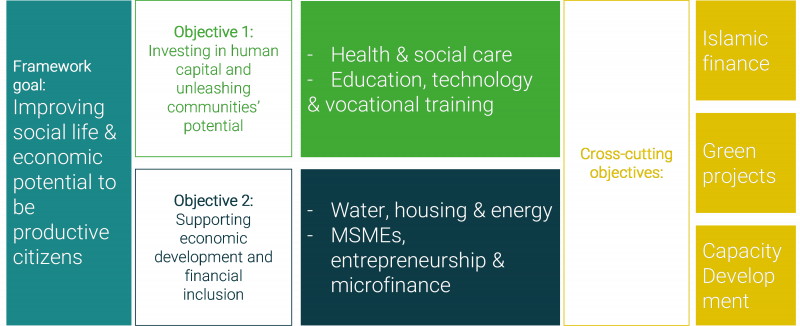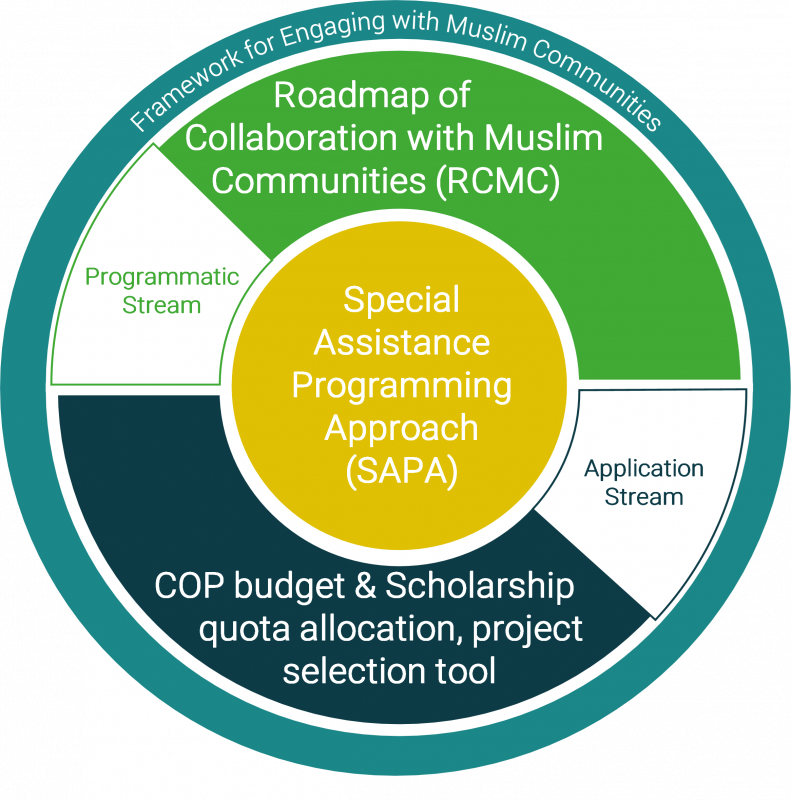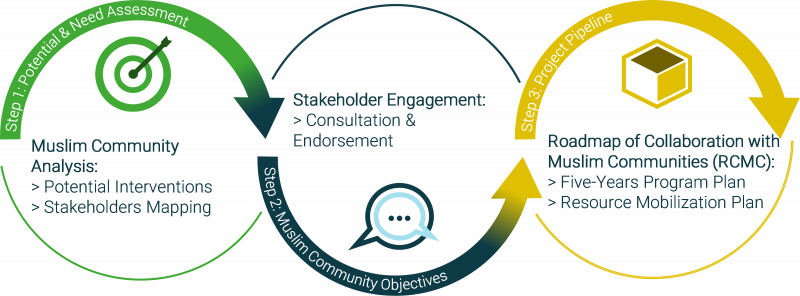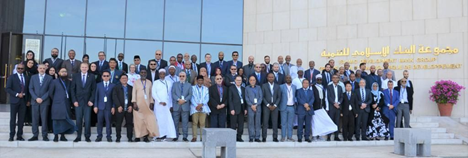Approach
Framework for Engaging with Muslim Communities (FEMC)
To better address the needs of Muslim communities, the Bank developed a Framework for Engaging with Muslim Communities (FEMC) centered on the Community Outreach Program (COP) goal of “Improving social life & economic potential to be productive citizens”.
This framework aims to comprehensively understand the challenges faced by Muslim communities and to address them with the most appropriate and impactful responses. It enables the Bank to ensure its resources are channeled efficiently to where they are needed most, through projects that maximize impact and fully leverage the potential of Muslim communities.
The COP goal is articulated around two overarching objectives coming from its mandate, and focused on four main sectors, promoting three cross-cutting areas. The first objective is “investing in human capital and unleashing communities’ potential” through (1) health and social care, and (2) education, technology, and vocational training. The second objective is focused on “supporting economic development and financial inclusion” by developing (1) water, housing, and energy, and (2) micro, small, and medium enterprises (MSMEs), entrepreneurship, and microfinance. The cross-cutting areas aim at promoting (1) green projects, (2) Islamic finance, and (3) capacity development.

Alignment with the Bank’s strategic orientation was a prerequisite for designing the framework that ensures all operations support its mandate and purpose, while providing a clear scope of interventions
Project Sourcing through a Programming Approach
The FEMC is operationalized through the Special Assistance Programming Approach (SAPA), ensuring that resources are efficiently directed to areas of greatest need through high-impact projects that fully leverage the potential of the Muslim communities.
Framework for Engaging with Muslim Communities Project Sourcing Features

The SAPA is a core component of the FEMC that defines
the criteria and tools through which interventions are identified and included within the scope of the framework. It provides a systematic methodology for objectively selecting projects that align with the goal and objectives of the Special Assistance Program, aiming to determine the appropriate interventions. Based on a preliminary contextual analysis of Muslim communities, which captures their structure/segments and the socioeconomic development levels, SAPA will define the Bank solution offering through a set of sector-specific interventions tailored to the different segments of the identified communities.
SAPA provides two streams for sourcing projects and defining the annual projects plan:
- Application Stream: This stream handles requests submitted by various communities’ organizations. The programming approach is strengthened through the use of a project selection tool to shortlist proposals, along with a regional budget allocation mechanism to ensure efficient monitoring of the geographic distribution of the COP financial resources. historically, the Application Stream has served as the main channel for submitting funding requests from the COP.
Programmatic Stream: This stream is supported by a new engagement platform that will ensure the delivery of tailor-made intervention plans for the target beneficiaries, in collaboration with key community stakeholders. This stream is proactively initiated by the SAP officers in a given country.
Roadmap of Collaboration with Muslim Communities (RCMC)
The programmatic stream is implemented through the Roadmap of Collaboration with Muslim Communities (RCMC), which is initiated for a specific Muslim community in a given country. Similar to the Bank’s Country Engagement Framework (CEF), the RCMC is codeveloped with an umbrella organization that represents the interests of the Muslim community in a given country. informed by a contextual analysis that offers insights into the community socioeconomic development and structural composition/segmentation, the RCMC aims to leverage the capacities and potential of Muslim organizations through a dedicated engagement platform, ensuring ownership, contribution, and sustainability. Spanning a five-year period the RCMC is focusing on socially impactful sectors through a pipeline of projects that are aligned with the specific needs of Muslim community.
The formulation of the RCMC (Five-Year Program Plan) follows three major steps.
Steps Formulation for the Roadmap of Collaboration with Muslim Communities

|
This step aims to identify the key needs within the community that the RCMC should address, as well as uncover the potential that can be harnessed through the influential community players/actors to benefit of the community and society. |
The consultation process aims to build a coalition of stakeholders united around a common set of objectives that define the RCMC focus areas and outcomes to be achieved |
The coalition will develop a project pipeline aligned with the common objectives. To ensure its implementation, the RCMC coalition will also formulate a resource mobilization strategy to bridge the financing gap. |
Conclusion
The FEMC will not only respond to the reform needs prompted by the Bank’s new strategic orientation but will also broaden the SAP’s footprint within Muslim communities worldwide. The framework primarily serves to align all operations with the Bank’s priorities and program mandate, focusing on addressing the needs of the most vulnerable and harnessing the potential of communities both locally and globally.
SAPA is identifying relevant areas of intervention based on the specific context, allowing the Bank to tailor its response plan for greater effectiveness and lasting impact. The RCMC reinforces the bonds with representative organizations within Muslim communities', enabling detailed stakeholders mapping and facilitating projects monitoring and impact reporting. Additionally, the framework supports the mainstreaming of successful pilot projects in critical sectors such as technology in education and health, entrepreneurship, and livelihood. Finally, the FEMC empowers the SAP to position itself as a facilitator and catalyst in supporting and connecting Muslim communities worldwide.
The Special Assistance Division organized the Muslim Communities Dialogue Meeting under the theme “Renewed Engagement for Enhanced Collaboration” on 13-14 December 2023 at the IsDB Headquarters. This event brought 49 delegates representing 36 organizations from 21 non-member countries from around the world to discuss the new approach of collaboration with the Muslim communities titled “Framework for Engaging with Muslim Communities”. Organized to review, discuss, and endorse the new FEMC approach by representatives of the Muslim
communities, the event was the opportunity to reinvigorate the Bank’s engagements with Muslim communities, listen to their needs, and strengthen future collaborations.
